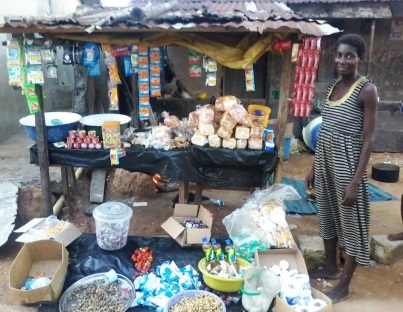Maria, a 36 year old Person Living Positive (PLP) widow residing in Adim Community in Biase Local Government Area of Cross River state, lost her husband with whom she had three kids and got involved with another man who promised to marry her. She had a child for the latter but he eloped, leaving her to cater for all the kids alone. With no source of income, aside the occasional N500-700 she got for weeding farmlands and four hungry mouths to feed; she began yielding to men who were interested in satisfying their sexual appetites with her in the community. Although farming and trading are the major occupations there; traditionally, women are not allowed to hold titles and are regarded as second class citizens who cannot own lands but can lease them for farming. The poverty rate is so high that like Maria, very high risk sexual activities take place among the girls, women and men especially among the widows who are regarded as free women. When her situation became unbearable, Maria had to release her fourteen year old daughter to a distant relative in Abuja for care which she cannot monitor from her location.
The President’s Emergency Plan for AIDS Relief (PEPFAR) through a United States Agency for International Development (USAID) funded project – Local Orphans and Vulnerable Children Partners in Nigeria- Region 3 (LOPIN3), with as the lead partner enrolled Maria’s household in 2015. During the intervention, she received HIV Testing and Counseling services where she was discovered to be positive and referred to the nearest Primary Healthcare Centre (PHC) for CD four count and further treatment. She also received training on the importance of proper healthcare like the need to sleep under insecticide treated nets, in nutrition, education, effective parenting skills, gender norms and financial literacy through the Catholic Archdiocesan Action Committee on AIDS (CAACA), a HIFASS-LOPIN 3 Community Based Organisation (CBO).
Maria by her shop

As one of the project beneficiaries of seed grants in her community, she also received N30, 000 with which she started table trade. After about two months, Maria has this to say “Men no longer take advantage of me since I started my business, as I no longer depend on any one to provide for my family’s needs”. She now sells provisions daily and farm produce on market days.
This empowerment has boosted her self-esteem as she is able to feed, clothe, pay medical bills for and support the education of her children. In addition, along with other empowered caregivers, she was trained on Savings and Internal Lending Communities (SILC), they were taught to save and borrow money amongst themselves to improve their businesses.
CAACA and the HIFASS-LOPIN 3 Technical Point Person will continue to monitor and mentor Maria to see that her business keeps growing. The Community OVC Improvement Team (COIT) and Community Volunteers (CVs) are also on ground to offer necessary support to Maria and all empowered households in the community.
Disclaimer: This success story was made possible by the kind support from the American people delivered through the U.S. Agency for International Development (USAID). The contents are the responsibility of Health Initiatives for Safety and Stability in Africa (HIFASS) and do not necessarily reflect the opinion of USAID or the U.S. Government.